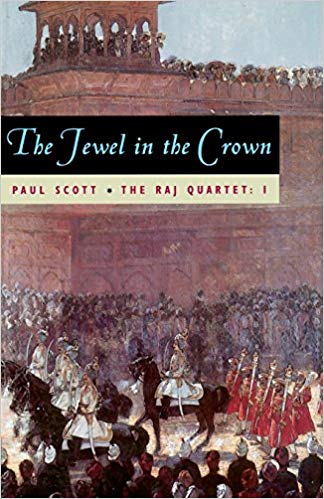The Jewel in the Crown
(1966)

I was forty or fifty pages into this book when it penetrated my little brain that it wasn’t going to be a straightforward novel about the last days of Imperialist Britain in India. Consequently, I laid it aside for a few days and then started it again from a different perspective.
I’m glad that I did.
Perspective is what Paul Scott’s 1966 novel The Jewel in the Crown is all about. We start off by seeing India in 1942 from the point of view of Miss Crane, a teacher and one-time admirer of Ghandi. Although she has lived in the country for many years, she has never truly settled in either of the two worlds that she inhabits: that of India or that of the British. She’s an interesting and sympathetic character, but just when we think that this is her story – and the whole of Part One is focused on her, even down to using her name as its title — we find out that she is almost something of a peripheral character. Well, to an extent.
In fact, the main character is probably Daphne Manners, a plain and idealistic young woman who has become involved with a handsome young Indian, Hari Kumar. Hari’s life has become a living hell since the death of his father. He is in all but skin colour an Englishman, having spent his entire life in their country; but when his father dies bankrupt he has no choice but to return penniless to India, a country that he has neither a liking nor affinity for.
He has lost everything, not least of all social standing and money; but to make matters worse it is his very education and public school accent that draws the fire of the catalyst for the novel’s action, the police chief Ronald Merrick, who sees the young man as an uppity wog who needs to know his place.
Merrick attempts to form an attachment with Daphne, who instinctively recoils from him as being an essentially nasty piece of work; but it seems to me that the very reason he wants to know her better is because he is aware of her relationship with Hari. He’s an odd fish, to be sure, as well as a decidedly racist and sadistic one. Most crucially, he has a king-sized inferiority complex.
As we read on we become gradually aware that what we are going through are memories, letters and documents that have been collected by an unknown Briton some twenty-odd years after the events of the novel. Because of this we get a perspective not only from the many characters involved, but also from two different decades – the 40s and the 60s. This doesn’t make it a particularly hard read, but it’s not an easy one either. And I personally loved everything about The Jewel in the Crown.
There are numerous fascinating players here, but one of my favourites is Lady Chatterjee. At first finding her annoying, I grew to very much admire the gentle but stoical endurance that she shows throughout. She is a genuinely royal personage and yet is mocked and disparaged by the snobbish British community, whose ridiculous hypocrisies and aspirations are put so blindingly on show in the section called ‘An Evening at the Club’.
It’s hard not to loath the Imperialist attitude of the Brits here, despite the fact that Paul Scott – who had been with the British army in India – attempts to stay reasonably neutral.
It is set against a complicated background: the British know their time in India is drawing to a close, but don’t seem to be coming to terms with that fact; and their backs are to the wall with the war against Germany not to mention just having had a severe spanking from the Japanese, undermining even further their standing in India.
The characters are equally complex. For example, I really didn’t care for Daphne at all; yet I admired her courage. I didn’t care for Brigadier Reid, the kind of person I could never warm to; yet I admired his courage.
On the very first page we are told that this will be the story of a rape. Well, so it is. There is the awful gang rape of Daphne; but there is also the rape of Hari Kumar, albeit an emotional rather than physical one.
And there is of course the rape of India itself. Queen Victoria may have considered the country to be the Jewel in her Crown; but her subjects treated it with something less than respect.
A wonderful book and the first part of what was to become known as The Raj Quartet.

Paul Scott 1920 – 1978

March 29, 2020
Thank you for sharing your review of this remarkable novel. Back in 1980s I thoroughly enjoyed the television production of The Raj Quartet. Recently I was reminded of it because of the actress Geraldine James, who played Sarah Layton years ago and who currently stars as Marilla in the latest adaptation of Anne of Green Gables.
In the last ten days, I have alternated between listening to the book, beautifully narrated on Audible, and reading it on Kindle. I chose to read the end because the story got too painful to listen to—my mind needed the distractions of letters on the page.
The complexities of the different sorts of bigotry—class, nationality, education, accent, skin color—resonated on every level with me. Even if I hadn’t seen the television production, and I must admit my memory is pretty dim, I found that Mr. Scott used his language so evocatively that I could paint a picture of Mayapore, the MacGregor House, the Bibighar gardens and all the principals therein.
March 29, 2020
I haven’t bothered with this blog in a couple of years now; so, Anne, thank you for that lovely comment! At a time when we could all do with a little cheering-up, you’ve quite made my morning.
I take it you’ll go on to see how the stories of the various characters develop in ‘The Day of the Scorpion’? You won’t be disappointed.
I haven’t seen the TV adaptation, but I’m a great admirer of Geraldine James and would be curious as to how she played Sarah.
Oddly enough, I took a notion to read ‘Anne of Green Gables’ recently and was knocked out by how good it is – I don’t know how anyone could dismiss this as ‘just’ a children’s story.
I’ve just been looking at your own rather mouth-watering website and look forward to going through it more fully later today.
In the meantime, thank you again for your kind words and may you and yours STAY SAFE!